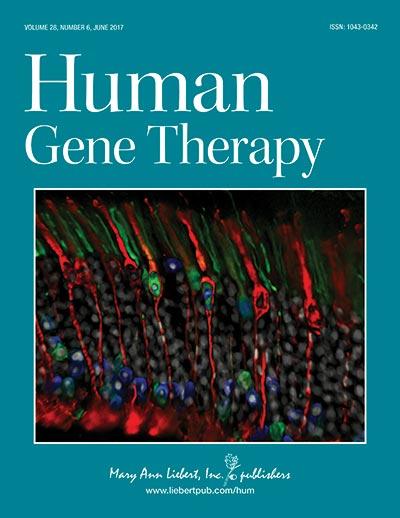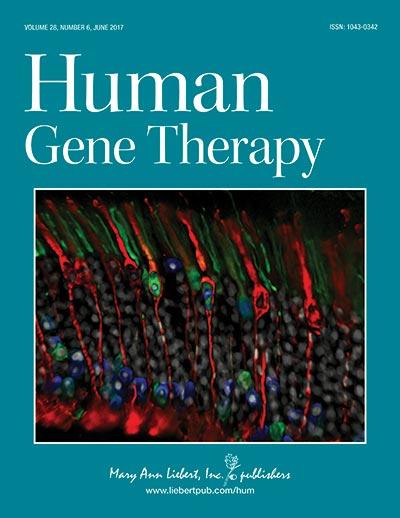
Credit: Mary Ann Liebert, Inc., publishers
New Rochelle, NY, July 10, 2017–Researchers have successfully used a noninvasive intranasal approach to deliver the gene for the enzyme that is deficient in the inherited lysosomal storage disease mucopolysaccharidosis type 1 (MPS 1) to the brains of an MPS mouse model, and have demonstrated the presence of the therapeutic enzyme throughout the mouse brains. Five months later, the treated mice did not exhibit the learning and navigation deficiencies seen in untreated mice, as reported in an article published in Human Gene Therapy, a peer-reviewed journal from Mary Ann Liebert, Inc., publishers. The article is available free on the Human Gene Therapy website until August 10, 2017.
Lalitha Belur, PhD, University of Minnesota, MN and coauthors from University of Minnesota, Regions Hospital (St. Paul, MN), and REGENXBIO (Rockville, MD), evaluated the effectiveness of using an adeno-associated virus (AAV9) vector to deliver the gene for alpha-L-iduronidase (IDUA), which is deficient in people with the inherited metabolic disease MSP 1, across the blood-brain barrier using an intranasal delivery route.
The researchers demonstrated the feasibility of gene delivery to the central nervous system as well as the ability to correct the metabolic defect and prevent the neurologic dysfunction associated with MPS 1. They present the study design and results and discuss the implications of their findings in the article entitled "Intranasal AAV Mediated Gene Delivery and Expression of Human Iduronidase in the CNS: A Non-invasive and Effective Approach for Prevention of Neurologic Disease in Mucopolysaccharidosis Type 1."
"The unique anatomy of the olfactory system allows intranasal AAV vectors to circumvent rather than having to penetrate the blood-brain-barrier," says Editor-in-Chief Terence R. Flotte, MD, Celia and Isaac Haidak Professor of Medical Education and Dean, Provost, and Executive Deputy Chancellor, University of Massachusetts Medical School, Worcester, MA. "If this mechanism can be exploited in humans as well, it could represent the key to treating numerous other genetic disorders affecting the brain."
Research reported in this publication was supported by the National Institutes of Health under Award Number NS062158. The content is solely the responsibility of the authors and does not necessarily represent the official views of the National Institutes of Health.
###
About the Journal
Human Gene Therapy, the Official Journal of the European Society of Gene and Cell Therapy, British Society for Gene and Cell Therapy, French Society of Cell and Gene Therapy, German Society of Gene Therapy, and five other gene therapy societies, is an authoritative peer-reviewed journal published monthly in print and online. Led by Editor-in-Chief Terence R. Flotte, MD, Celia and Isaac Haidak Professor of Medical Education and Dean, Provost, and Executive Deputy Chancellor, University of Massachusetts Medical School, Human Gene Therapy presents reports on the transfer and expression of genes in mammals, including humans. Related topics include improvements in vector development, delivery systems, and animal models, particularly in the areas of cancer, heart disease, viral disease, genetic disease, and neurological disease, as well as ethical, legal, and regulatory issues related to the gene transfer in humans. Its companion journals, Human Gene Therapy Methods, published bimonthly, focuses on the application of gene therapy to product testing and development, and Human Gene Therapy Clinical Development, published quarterly, features data relevant to the regulatory review and commercial development of cell and gene therapy products. Tables of contents for all three publications and a free sample issue may be viewed on the Human Gene Therapy website.
About the Publisher
Mary Ann Liebert, Inc., publishers is a privately held, fully integrated media company known for establishing authoritative peer-reviewed journals in many promising areas of science and biomedical research, including Nucleic Acid Therapeutics, Tissue Engineering, Stem Cells and Development, and Cellular Reprogramming. Its biotechnology trade magazine, GEN (Genetic Engineering & Biotechnology News), was the first in its field and is today the industry's most widely read publication worldwide. A complete list of the firm's 80 journals, books, and newsmagazines is available on the Mary Ann Liebert, Inc., publishers website.
Mary Ann Liebert, Inc. 140 Huguenot St., New Rochelle, NY 10801-5215 http://www.liebertpub.com Phone: (914) 740-2100 (800) M-LIEBERT Fax: (914) 740-2101
Media Contact
Kathryn Ryan
[email protected]
914-740-2250
@LiebertPub
http://www.liebertpub.com
Original Source
http://www.liebertpub.com/global/pressrelease/intranasal-gene-delivery-noninvasive-approach-shows-efficacy-for-preventing-neurologic-effects-of-inherited-metabolic-disease/2214/ http://dx.doi.org/10.1089/hum.2017.187





